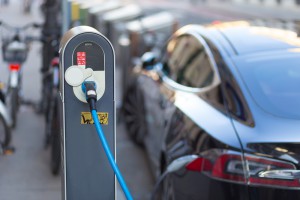Should rural businesses plug into electric vehicles? – That’s what a recent study in rural Warwickshire sought to answer. The results of the study, announced as part of the Economic and Social Research Council’s nationwide Festival of Social Science, are being discussed at an event next month.
 Businessmen and women interesting in testing out the technology and understanding whether it’s a market they should plug into are invited to discuss the findings and test drive the latest technology on Wednesday, 9 November. Between May 2014-June 2016, the small rural businesses were invited to use electric alternatives for work and leisure, visiting clients, carrying out deliveries and supporting staff travel. The two year trial by Coventry University, Warwickshire County Council and Greenwatt saw 16 companies from a range of sectors ditching diesel and hooking up to electric cars and vans.
Businessmen and women interesting in testing out the technology and understanding whether it’s a market they should plug into are invited to discuss the findings and test drive the latest technology on Wednesday, 9 November. Between May 2014-June 2016, the small rural businesses were invited to use electric alternatives for work and leisure, visiting clients, carrying out deliveries and supporting staff travel. The two year trial by Coventry University, Warwickshire County Council and Greenwatt saw 16 companies from a range of sectors ditching diesel and hooking up to electric cars and vans.
Throughout the study, researchers from the university analysed the use of the vehicles along with any savings, participant feedback and CO2 savings. In total, the fleet of 17 vehicles loaned across the trial completed 211,934 miles for the businesses involved. One organisation that took part saved £3,226 in fuel costs across the trial period. To calculate the savings, researchers took a snapshot each month of the price of diesel locally (using three postcodes) and used this against each vehicles recorded mileage. The cost of charging the electrical vehicles was then deducted from diesel costs to estimate monthly savings.
 Researchers also found that small businesses could benefit from additional marketing opportunities, for using green technology, along with potentially reducing their carbon footprint. The free event, Rural Electric Vehicles (WREV) Showcase, will be held at Stareton Hall, Stoneleigh Park from 9.30am to 3pm Including speakers from businesses who took part in the trial, industry experts and researchers, the event is open to anyone interested in learning more about the technology. More information and event registration is online.
Researchers also found that small businesses could benefit from additional marketing opportunities, for using green technology, along with potentially reducing their carbon footprint. The free event, Rural Electric Vehicles (WREV) Showcase, will be held at Stareton Hall, Stoneleigh Park from 9.30am to 3pm Including speakers from businesses who took part in the trial, industry experts and researchers, the event is open to anyone interested in learning more about the technology. More information and event registration is online.
Jason Begley, Research Fellow at Coventry University’s Centre for Business in Society, said: “Reducing carbon emissions from the transport sector remains an important and pressing concern that impacts all UK motorists. The role of new vehicle technologies is central to this process, but their introduction present a number of challenges for users. This is especially true for rural motorists who are more dependent than their urban counterparts on having access to a vehicle to ensure they can connect with vital services and maintain strong social networks for work and living. The WREV trial is a timely reminder of the very different experience this group of motorists encounter on a daily basis, particularly for rurally-based businesses that depend on economic and effective transport solutions. The findings from this trial will help our understanding of their needs and inform policymakers and other stakeholders in their decision-making when it comes to carbon emissions, low carbon technology and rural motoring.”
Mike Woollacott, project director at Greenwatt Technology said: “This project has highlighted that there are many rural businesses whose driving cycles are ideally suited to the electric vehicle especially when suitable charge points are installed. Our project participants across rural Warwickshire have experienced for themselves the benefits of ‘driving electric’ – no exhaust fumes and emissions, genuine fuel savings which can be reinvested back into the business, independence from fuel station refuelling – and the sheer enjoyment of the quiet, comfortable and easy driving style electric vehicles!”


